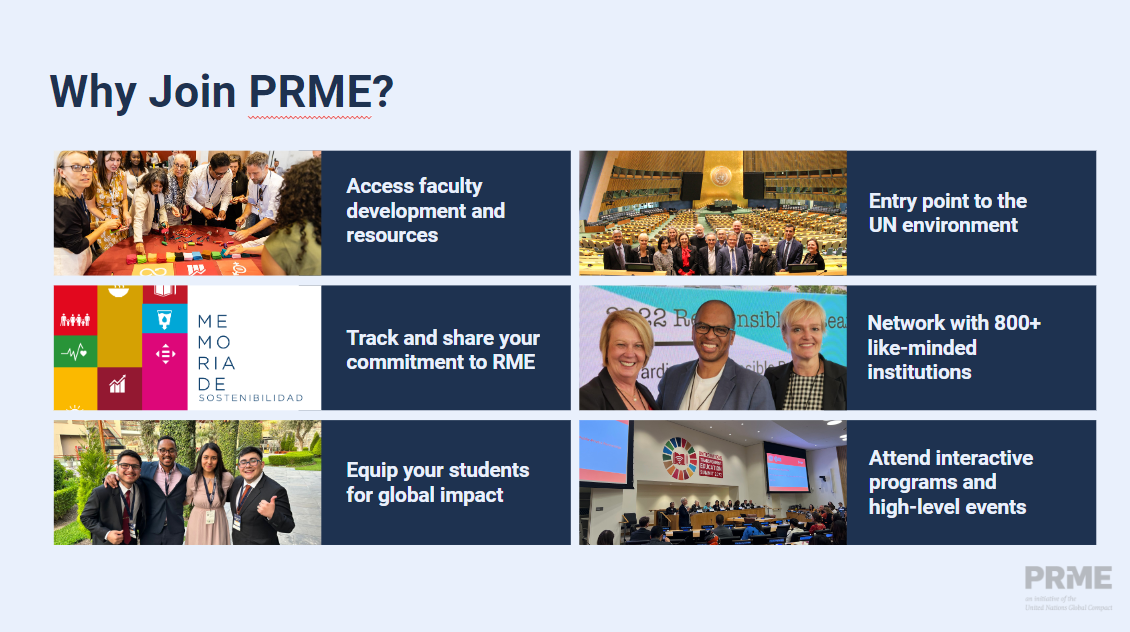Access

- Submit your institution’s Sharing Information on Progress (SIP) Report
- Access SIP reporting across institutions
Access

Access

PRME is an initiative of the UN Global Compact founded in 2007 and similarly follows a principles-based approach for engagement. As a platform to raise the profile of sustainability in higher education around the world, PRME equips today's business students with the understanding and ability to deliver change tomorrow. Working through Seven Principles, PRME engages business and management schools to ensure they provide future leaders with the skills needed to balance both economic as well as social and environmental priorities, while drawing attention to the Sustainable Development Goals (SDGs) and aligning academic institutions with the work of the UN Global Compact. As a voluntary initiative with over 800 Signatories across 96 countries worldwide, PRME has become the largest organised relationship between the United Nations and management-related higher education institutions.
As PRME is an integral part of UN Global Compact, we have at our immediate disposal an opportunity to provide a more tailored offering to Academic Participants from the UN Global Compact community, with sector-specific Principles and engagement opportunities, while fostering improved business partnerships from an academic lens.
PRME Signatory Members will be able to continue their engagement with the UN Global Compact via PRME. PRME will serve as the gateway for academic engagement with UN Global Compact’s network of businesses, primarily via Chapter and Country Network collaborations.
Academic participation with Country Networks is encouraged to continue in line with individual Network policies. Such relationships will be further supported by engagement through the PRME Regional Chapters. Existing PRME Signatory Members will also have the option to engage with Global Compact Country Networks if so agreed to by the PRME Signatory Member and the Country Network in which the Signatory is located. Such local engagement is optional and may entail a financial contribution, depending on the Local Network requirements for the same.

Learn more about the abovementioned benefits, as well as next steps, here.
PRME was designed to service academia, specifically leadership, business, and management-related higher education institutions (HEIs). Membership to PRME is defined in three key areas of commitment:
Engaging with a global community of practice on responsible management education and thought leadership, including cross-regional knowledge exchange
Attracting prospective students to an existing network of over 3 million sustainably-minded peers, and faculty to a network of over 200 thousand colleagues
SIP Reporting: Often used as a central planning tool for universities and business schools, as well as an asset for other sustainability reporting and accreditation aspirations, PRME Signatory Members submit a Sharing Information on Progress (SIP) annually. This would be in place of the COE.
Financial Contribution: Based on its operating budget, each Signatory Member is expected to contribute to PRME's Annual Service Fee. By contributing to the Annual Service Fee, you will be supporting the PRME Secretariat and the important work of the PRME community. To learn more about the Mandatory Service Fee and see the 2024 tier amounts, see here.
Academic institutions that are publicly recognised (i.e. legal/government recognition) and are degree-granting (with business programs provided) are eligible to join PRME. Primary and secondary schools, as well as academic networks, are not eligible to join PRME at this time, but if you are interested in learning more about other ways to engage with PRME outside of traditional membership, please contact the PRME team at info@unprme.org.
If this is the case, you are welcome to join under the existing membership of your university, or combine membership with your affiliated faculty/department. By doing so, you will share the membership fee and amplify collective impact. If you have more questions on how to merge memberships, please contact the PRME team at info@unprme.org. Alternatively, you may be able to join as a separate member.